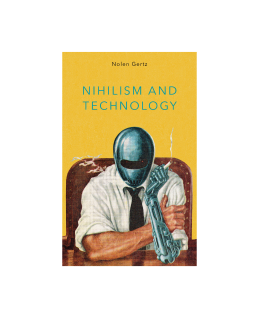
Additional Information
Book Details
Abstract
Heidegger, Marcuse, and Ellul warned against the rise of a technological mass culture. Philosophy of technology has since turned away from such dystopic views, promoting instead the view that we shape technologies just as technologies shape us. Yet the rise of Big Data has exceeded our worst fears about Big Brother, leading us to again question whether technologies are empowering us or enslaving us.
Rather than engage in endless debates about whether technologies are making us better or making us worse, Nolen Gertz investigates what we think “better” and “worse” mean, and what role this thinking has played in the creation of our technological world. This investigation is carried out by using Nietzsche’s philosophy of nihilism in order to explore the ways in which our values mediate how we design technologies and how we use technologies. Examining our technological practices—practices ranging from Netflix and Chill to Fitbit and Move to Twitter and Rage—reveals how our nihilism and our technologies have become intertwined, creating a world of techno-hypnosis, data-driven activity, pleasure economics, herd networking, and orgies of clicking.
An extremely important and thought-provoking study that is refreshingly original. By examining current technologies through the eyes of nihilism, Gertz provides new insights and ways of looking at how humans interact with these technologies. It is highly readable and should become part of any course in the philosophy and ethics of technology.
John Weckert, Professor of Computer Ethics, Charles Sturt University
[…] a provocative and unsettling philosophical inquiry into our increasingly compulsive technological practices, revealing how our nihilism and our technologies have been raveled in a twist. [...] Gertz asks us whose meaning is being conveyed by emojis, what is the true currency of the sharing economy, why do we troll or shame others online, who is obeying the Fitbit’s command to “Move!”
By discussing technology through the lens of the Nietzschean question regarding nihilism, Nolen Gertz offers an interesting palette of philosophical inquiries that is highly relevant for thinking about the roles technology plays in our lives and existence. It speaks to many normative and existential concerns we should have today: does technology help us to remain complacent with the status quo and to avoid making important decisions about our lives? Do we exercise power over others by using seemingly innocent technologies such as social media? Is our dependency on Google proof of our reliance on external sources of meaning? Joining a growing choir of critical voices, Gertz shows that as individuals and as societies we face serious challenges here and that technology is not just about gadgets or things; it is also always about how to lead one's life.
Mark Coeckelbergh, Professor of the Philosophy of Media and Technology at the University of Vienna
[Nolen Gertz] is remarkably adept at translating Nietzsche’s analysis of nihilistic living — which looks at how we develop strategies for coping with a way of life that undermines our very humanity — into instantly recognizable terms stretching from “Netflix and chill” to smugshrugs and emoji to the gamification of health and well beyond.
Nolen Gertz’s Nihilism and Technology is a provocative and unsettling call to reconceive the entire social media ecosystem—and our increasingly compulsive participation in it—as a seduction to nihilism: an open invitation to seek ever-new escapes from ourselves, from the burdens of our choices, and from our own missed opportunities to make meaning in our lives and our world.
Shannon Vallor, William J. Rewak, S.J. Professor, Santa Clara University
In this short but hugely engaging book, Nolen Gertz […] manages to both provide a compelling and rich introduction to Friedrich Nietzsche and nihilism as well as avoid the all-too common reductionism of popular discourse around technology. Rather than boil down the question of technology to the simple binary choice of ‘is this thing good or bad?’, Nihilism and Technology presents a far more intriguing and challenging set of questions. […] The book is a lively and convincing read, which thanks to its wide appeal and accessible and often dryly funny prose, deserves to find a wide audience far outside the often narrow confines of academic philosophical discourse.
Nolen Gertz is Assistant Professor of Applied Philosophy at the University of Twente, and a Senior Researcher at the 4TU.Centre for Ethics and Technology. He is the author of The Philosophy of War and Exile (Palgrave-Macmillan 2014). His work has appeared in The Atlantic, The Washington Post, and ABC Australia.
Table of Contents
| Section Title | Page | Action | Price |
|---|---|---|---|
| Table of Contents | 7 | ||
| Preface | 9 | ||
| Acknowledgments | 13 | ||
| 1 Nietzsche and Chill | 17 | ||
| 2 The Will to ¯\\_(ツ)_/¯ | 29 | ||
| 3 The Hammer of the Gods | 51 | ||
| 4 Ecce Hulu | 75 | ||
| 5 Amor Fitbit | 105 | ||
| 6 The Uber Mensch | 127 | ||
| 7 Thus Spake Zuckerberg | 153 | ||
| 8 The Trolling of the Idols | 177 | ||
| 9 Google is Dead | 211 | ||
| Bibliography | 231 | ||
| Index | 239 | ||
| About the Author | 243 |
